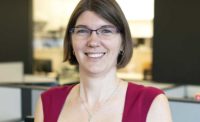Title: Senior Project Development Engineer, Perfection Group
Age: 39
Educational Experience: Bachelor’s degree in mechanical engineering, Ohio State University
Professional Credentials/Accreditations: Professional engineer (P.E., HVAC) and Certified Energy Manager (CEM)
Organizational Affiliations/Achievements/Awards: Member of ASHRAE and the Association of Energy Engineers (AEE). Awards: Construction Woman of the Year Finalist – Associated Builders and Contractors (ABC) Ohio Valley Chapter
What does your day-to-day job entail?
I am fortunate to have my day-to-day job differ as projects move from one phase to another with the privilege to wear many hats throughout my daily work. I work in the green division of Perfection Group, doing energy savings performance contracting (ESPC) and total facility solutions for customers involved in every phase of each project.
The beginning of the project starts with utility baseline normalization, going on-site for the detailed energy and facility audits, and documenting all site notes. The next phase of the project is the facility and HVAC scope development, calculating guaranteed energy savings, project cost estimating, and cash-flow analysis. Once the project has been finalized, the customers' deliverables are created for the presentation. After the project has been implemented, the guaranteed energy savings are tracked and verified.
Any typical day will fall anywhere in the differing phases of the project flow as mentioned above. I fill in the “downtime” with the development and implementation of the suite of tools Perfection uses for all aspects of the green division projects along with tools for other divisions within Perfection. I work closely with a small team of associates to restructure our suite of tools to allow for the growth that is and will be happening within Perfection. These tools are all Excel-based, and the inputs and outputs from all tools interface with an internally created database that holds every data point for all our green projects. This interaction allows each tool in the suite to continue to compile legacy data, making analyses faster and more accurate.
Every day is different, which keeps me constantly learning and implementing new things.
What caused you to/when did you fall in love with engineering?
It's a humorous story as to how I initially got into engineering. Upon going to college, I was unsure at the time of what I wanted to major in and had zero idea of what I wanted to do professionally. I had always loved math, science, and physics, so my mom mentioned going into engineering. I followed her suggestion, and after entering the discipline, I quickly realized she likely saved me several years of career searching because I would have settled here eventually. I tried several different engineering focuses prior to landing in mechanical. I knew I was in the right place with engineering but didn’t have any passion for it until I found mechanical.
After college, I started my career at Schneider Electric (formerly T.A.C.), performing ESPC on a local and global scale. My favorite project during this period was getting to work on the U.S. Coast Guard Puerto Rico project, which resulted in the largest solar PV array in a government contract as of that date. I gained a wealth of knowledge that I use to this day, but after almost 10 years, I decided I needed a change in career to broaden my own professional development.
I stumbled upon a much smaller local company (Perfection Group), specializing in HVAC service, mechanical design/build, and ESPC work. Perfection is a well-established and reputable company that had been in business for 60-plus years at the time, but Perfection’s green division had just started about 10 years prior to me joining the team, and company leaders were looking to grow the division.
I quickly realized my passion for engineering developed while at Perfection after realizing what it takes to grow a division. Perfection’s goals of growth, expansion, and development allowed me to greatly expand who I was as an engineer, which cultivated my capabilities to “wear many hats,” such as working in the office as well as the field, developing calculations for quicker analyses, creating processes and tools to resolve operational challenges, training younger engineers, and working in multiple departments at Perfection. I didn’t realize how much I loved my role as an engineer until I came to Perfection.
What has been the most rewarding/proudest aspect of your engineering career?
After obtaining my P.E. license, I quickly realized that was the tip of the iceberg. I wanted more understanding, interconnection between field and office, experiences, and personal expansion. In an attempt to fulfill this, I have achieved some professional accomplishments I am proud of.
Through the help of a colleague, I took the opportunity to design, size, and install the HVAC system in my house. While this sounds like a simple task for some, there were a lot of details I was missing, and doing it manually improved my understanding and comprehension of the process.
This “simple task” opened my eyes to the details required for the large-scale projects we work on at Perfection. Project planning, cost estimating, execution, pitfalls — everything you need to think about to go from concept to installation of a project all came in to play. This experience has and will continue to broaden my understanding of the full project implementation process and pieces involved. It is quite a growth experience to think you know something (on paper) and to be humbled by the details of installation.
One of the achievements I am extremely proud of is the in-house suite of software tools I have spearheaded the creation of for Perfection, such as baseline normalization tools, energy calculation tools, scoping tools, documentation tools, and cash flow analysis tools. Throughout my career, I have taught myself to read and write Excel’s code language (VBA). I utilized these skills to create the Excel-based tools utilized by the company today. These tools seamlessly integrate with each other and our database and cover every aspect of Perfection’s green division.
What challenges do women face in this profession? Can you give a personal example? Why aren’t there more women in engineering? How can we increase the number of women in engineering?
Being a female in a male-dominated profession can present challenges. While the people I work with respect me and my capabilities, I have run into instances with customers where that was not the case. For instance, I have been on-site where a customer wouldn’t talk in technical terms with me and waited for a male to join the conversation before he stated his HVAC issues. While situations like these are frustrating, they can also be extremely rewarding. Getting the chance to help “turn the dial,” so to speak, to show that females can be as successful as men in this profession, gives a real sense of pride and accomplishment.
To be honest, I’m not sure why there aren’t more women in engineering. I went to school with women who were extremely successful in math, science, and physics, but none of them pursued engineering careers. Maybe it is the stereotype of the male-dominated career that subconsciously detracts women.
My elementary/middle/high school experience lacked STEM labs, however there weren’t many of these back then, if any. If more girls at a young age got exposed to what they could possibly do with math, science, and physics, maybe more women would pursue careers in the field. I feel the tide is shifting because every school I have been in over the past five-plus years has a STEM lab in it — I am hoping in the coming years there will be more women emerging in the field.
How many years have you been active in the engineering sector? What’s changed the most in that time? What’s changed the least?
I have been in the engineering field for 15 years and have continued to specialize in the HVAC and ESPC discipline of engineering. Energy savings is of large importance to the customer in performance contracting. For example, 15 years ago, T12 lighting and noncondensing boilers were in the majority of buildings, and after decades of technology improvements, these buildings now have implemented new equipment and other energy-saving items. Despite the possible capital need for equipment upgrades, there is a finite amount of energy left once everything has already been converted to high efficiency. Stronger government efficiency standards continue to roll out as well.
The customer’s desire for energy savings continues, especially with increasing utility rates, but the amount of energy to be saved lessens. This situation opens the door to creative energy savings solutions. These creative solutions are not only fun to find, investigate, calculate the savings, and implement, but developing the methodology to contractually measure and verify these savings also poses a challenge.
My opinion of what has changed the least is geared toward my perception of the industry as a whole. With emerging technologies and thought processes, there seems to be a reluctance to adapt. The old, safe engineering ways work, and sticking with them will still provide the needed results, however acceptance to upcoming technologies seems much slower than the rate of technology growth itself.
What drives/motivates you every day?
I think my drive and motivation comes internally. I inherently can’t sit down, constantly have a need to be busy, and desire accomplishment. I am a very goal-oriented person and a team player. I spent my life trying to keep up with my sister athletically. I worked extremely hard, though I was never able to catch up to her. I think this instilled a notion of “never give up until you reach your goal.”
What remains on your engineering bucket list — what do you aspire to do that you haven’t accomplished yet?
For the past several years, I have been taking every opportunity that presents itself to grow and expand myself professionally. While this methodology has worked to this point, it will eventually catch up to itself. While I don’t know the exact direction of my engineering bucket list, some concepts that could be pursued come to mind.
My personal engineering bucket list could include interdisciplinary learning and growth. My major is in mechanical engineering, with a discipline in HVAC, however all engineering disciplines are incorporated within the projects we work on. Structural, electrical, civil, and even architectural engineering comes in to play. I would enjoy pursuing a deeper knowledge in these verticals.
While I am involved in local associations and affiliations, I would like to contribute more to them. I feel I have a lot I can offer and would like to get more involved there.
What’s one thing no one knows about you?
Some fun random things about me that might be outside of the norm: I have a twin sister; I have three kids (ages 10, 8, 6); I played two sports at Ohio State (rowing and soccer); I shoot on a trap team; my favorite adult beverages are beer and bourbon; I enjoy accessorizing my Jeep; and I make my family homemade Christmas gifts every year.
List any mentors who’ve helped you succeed and describe precisely how they’ve shaped your success.
Brian Kohler at Schneider Electric taught me early on how to create spreadsheet energy models. He also created all of Schneider’s spreadsheet tools that I learned to read the VBA code from, which was the basis for my self-taught code writing capabilities. This also opened my eyes to “someone has to create the tools.”
Nick Caton at Schneider Electric taught me a completely different point of view for energy modeling in eQuest (computerized energy modeling software). His knowledge of eQuest opened my eyes to what it was fully capable of. I worked in eQuest for five-plus years before his arrival, and what he was able to teach me in that program, which was immense and greatly opened my eyes to: “Know what you don’t know.”
Greg Horn at Perfection Group was the major bridge of mine that connected what was written on paper to what was utilized in the field. He, single-handedly, made sure I got on-site and saw every aspect of things that were developed in the office. Without interdisciplinary understanding, things developed in the office can miss pertinent things that can be detrimental to project success. The experiences I’ve learned from him are helping me bring everything I do to a deeper understanding.
What advice do you have for prospective female engineers considering entering the field?
The engineering field is wide and vast, and there is an immense amount of paths that can be taken professionally. Don’t be afraid to speak your mind and give your point of view. Keep your mind open to all that is around you and have fun with it.





